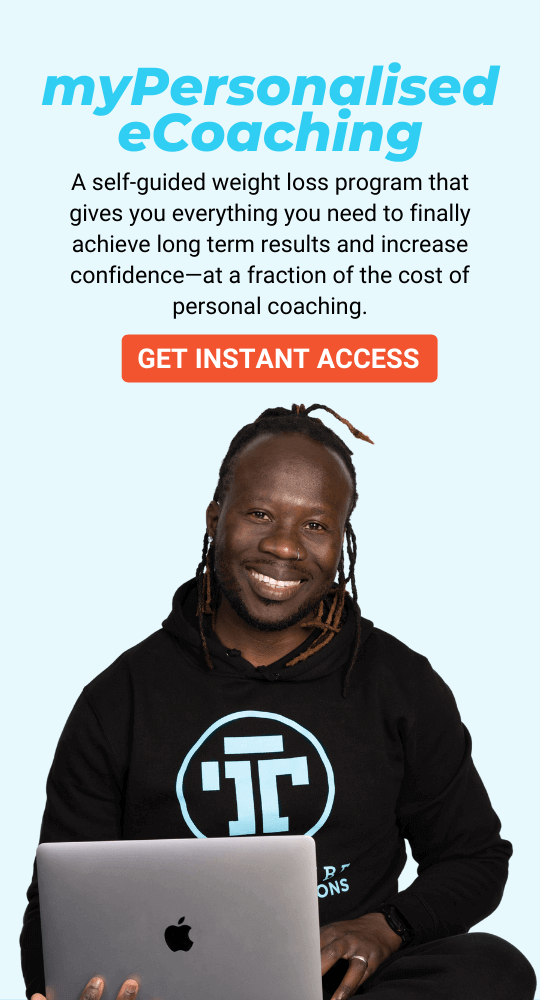If you’re like most people, you probably want to lose weight.
Whether it’s to lose 5 kilos or 25 kilos, the best way to ensure your success is to set some goals.
But we don’t mean just any goals, we mean SMART goals.
What are SMART goals?
Most people go about weight loss by deciding they want to ‘get fit’, or ‘tone up’ or ‘lose a couple of kilos’. But this approach doesn’t give you clarity about what you want to achieve, which makes it hard for you to achieve anything. But when you set a SMART goal, you automatically increase the likelihood of achieving it.
SMART is an acronym that stands for
- Specific
- Measurable
- Achievable
- Realistic and
- Time-bound
Let’s take a look Alison who is currently a size 16, but wants to wear her old size 12 jeans in six months. In this case:
- Alison’s specific goal is “I want to be able to wear my old size 12 jeans” NOT “I want to lose a few kilos”.
- She can measure her progress towards her goal by tracking data. In this case, trying her jeans on every week, and taking a photo of herself wearing them, is a visible way to measure progress.
- Saying “I will fit into these jeans in six months” is achievable for Alison. Saying “I will wear them in six weeks” is not achievable.
- Alison’s goal is realistic because she’s giving herself ample time to achieve the goal, and while it may be challenging, the goal isn’t out of her reach.
- She has put a time limit on this goal by giving herself six months to achieve it, rather than “seeing what she can do” in that time, or “hoping for the best”.
No matter what your goal is, it needs to meet the criteria of a SMART goal in order for you to have a chance at achieving it.
Why is your goal important?
In addition to making your goal a SMART one, you need to make sure the goal means something to you. Don’t set goals that are important to other people. Set goals that YOU want to achieve, and understand why you want to achieve them. Make sure that there is emotion involved in achieving this goal, and emotion involved in not achieving it. The more emotion you attach you to your goal, the better.
In the case of Alison, she used to be able to wear those jeans and she felt confident and happy when she did. Wanting to feel confident and happy again can help Alison stay focused because she knows how she will feel again when she reaches this goal. Fitting into her size 12 jeans is an emotional goal, and it’s her own personal goal that means something to her.
Work on your habits
One of the most overlooked things when it comes to losing weight is working on habits.
Most people just jump straight in, go on a diet, restrict their food, start exercising and focus on burning calories in order to lose weight.
However, this approach is very short-sighted and will not lead to long-term weight loss that’s sustainable. The key is to identify and work on the habits that have led you to become overweight in the first place.
Because until you do this, any weight you lose will be short-lived.
In Alison’s case, one of her habits is bingeing on food and drinking wine every night. The reason Alison does this is that it helps relieve stress. She’s also come to see it as ‘her time’ because she spends most of her time doing things for other people, like going to work, running a household, raising kids and helping her elderly parents.
Two key changes Alison can make to help her overcome this habit of excess calorie consumption each night is to learn how to manage her stress, and learn to take time for herself without feeling guilty.
Once Alison reduces stress in her life, and starts doing things for herself instead of giving all of her time and energy to other people, she’ll find that eating and drinking will no longer have the hold over her it currently does, and she’ll be able to make progress towards losing weight.
But if she fails to address these habits, she’ll be fighting against herself. On one hand, she’ll be cutting back food and increasing her exercise, yet she’ll still be feeling stressed and craving time for herself, which will only fuel her habit of overindulging every night, and sabotage her weight loss efforts.
The good thing about addressing habits, is that you can set these as mini-goals, that will help you achieve the ultimate end-goal.
Focus on the process, not the goal
The final secret on setting SMART goals is to focus on the process you need to go through, to get to the end result.
Yes, it’s important to set your goal and be able to see it clearly in your mind. However, if you only focus on getting to your destination, you’ll fail to learn the lessons, change the habits, and do the things that will help you get there in the end.
Think of it like a road trip. When you decide to hit the road, you know where you want to end up. But do you just get in and drive, hoping you’ll make it? Of course not! You use a map. And as you drive, you check your progress, you make sure you’re following the map, and you focus on the different legs of the journey, and the key milestones along the way, to ensure that you’re going in the right direction.
Losing weight is the same. By all means, set your SMART goal so you know where you’re headed, but don’t forget to focus on the road that will take you there.
Your road map will depend on where you’re at, what habits currently hold you back, and where you want to go. And the milestones you set along the way, will ensure you’re on the right track.
In Alison’s case, one of her milestones might be to only drink alcohol on the weekends and to limit it to two drinks at a time. This may take some time to achieve, especially if the habit of drinking is strong. But it’s a great plan to help her cut back her alcohol consumption and start changing her habit.
Another one of her milestones might be to regularly take an afternoon off for herself each week. This will ensure she’s getting time to herself which will also help reduce stress. Once again, she may need to work at this, but when it’s a new habit, she’ll find that her lifestyle is more aligned towards helping her lose weight than it was before.
Want to set SMART goals?
At Imani Tribe, we help our clients set SMART goals, and we help them design their own personal roadmap to achieving that goal. We do this by providing tools and strategies so they can begin changing habits that have previously prevented them from losing weight.
If you’d like to develop your roadmap to success, we’d love to hear from you.


















